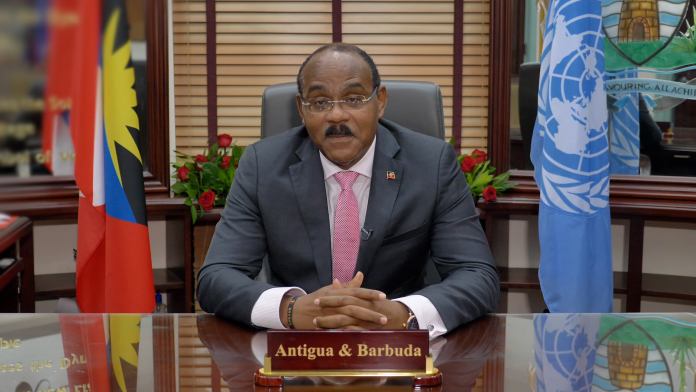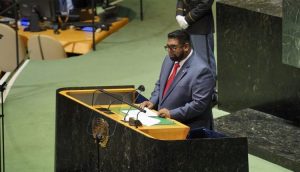
Chairman of the Caribbean Community (CARICOM) Gaston Browne has called out countries for placing additional restrictions on vaccinated Caribbean travellers by not recognising some of the vaccines they may have been immunised with.
Browne, who is the Prime Minister of Antigua and Barbuda, said this during his address to the 76th Session of the United Nations General Assembly on Friday last. Then, the Prime Minister spent much of his time lamenting the unequal distribution of vaccines.
Even as developing countries, like those in the Caribbean, deal with unequal access to vaccines, Prime Minister Browne said that there is yet another concern unfairly affecting Caribbean countries. That is the recognition and acceptance of the COVID-19 vaccines.
Some countries around the world plan to institute travel restrictions or have already rolled out some restrictions; generally, full vaccination is an emerging requirement for travel.
However, some vaccines are not being recognised by some countries and as such, travellers would have to be quarantined upon arrival.
According to Canadian and United Kingdom (UK) travel guidelines, the accepted COVID-19 vaccines are the Pfizer, Moderna, AstraZeneca and Johnson & Johnson vaccines.
The United States (US) has said that from November, people visiting the US must be fully vaccinated against COVID-19, but the country is still to make a decision on which vaccines it will accept.
These restrictions raise some concerns over whether people fully immunised with the Chinese-made Sinopharm vaccines and the Russian-made Sputnik V vaccines will be allowed to travel.
Browne, however, stressed: “Governments cannot urge people to get inoculated on the basis that the best vaccine is the available vaccine, and yet discriminate against vaccines that were not manufactured directly in North America and Europe.”
He likened these actions to a “vaccine apartheid” and contended that such actions would constrain efforts to vaccinate about 70 per cent of the world’s population by September, next year.
And the CARICOM Chairman emphasised, “This discrimination must cease now before it becomes a norm by some developed countries.
“It is wrong, unjust and patently unfair.”

Prime Minister Browne was not the only Caribbean leader who raised the concern of vaccine discrimination. Guyana’s President Dr. Irfaan Ali did too.
During his address on Thursday, he said, “The access to vaccines saw the world polarised.”
He continued: “…we must not now hurt our efforts at ending this polarisation of access to vaccines by implementing measures that divide us and curtail our movement based on the type of vaccines our people took.”
Meanwhile, as has been well ventilated by many leaders of developing countries, Prime Minister Browne lamented the inequalities in the global vaccination thrust.
He highlighted that vaccines were hoarded by the richer countries and that pharmaceutical companies demanded prices beyond the capacity of countries’ economies that were already “decimated” by the harsh effects of the pandemic.
“… the world should not witness such a spectacle again,” the Chairman stated firmly.
And as such, the Prime Minister told the gathering of world leaders that the equitable distribution of the life-saving COVID-19 vaccines should be a priority.
Moreover, he said that adequate resources should be made available to deal with COVID-19 testing and treatment too.













He is so right.